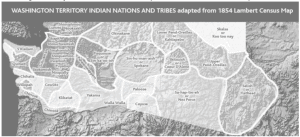Here’s a pending Supreme Court case, Herrera v. Wyoming, that hasn’t shown up in the Forest Service litigation summaries. The federal government is defending the right of a Native American to hunt on the Bighorn National Forest without complying with state hunting laws. If they lose, tribal treaty rights, as currently understood, could be severely diminished. The hearing is scheduled for January 8.
When the native tribes ceded their lands to the federal government, the language in the treaties typically preserved their rights to various uses and activities on indigenous lands that were not included within the new reservation, for which the treaties used the terms “open and unclaimed” or “unoccupied” lands. Much of that land is now part of national forests. Here is how the Forest Service interprets the language referring to those lands:
The term applied to public domain lands held by the United States that had not been fenced or claimed through a land settlement act. Today, “open and unclaimed lands” applies to lands remaining in the public domain (for the purposes of hunting, gathering foods, and grazing livestock or trapping). The courts have ruled that National Forest System lands reserved from the public domain are open, unclaimed, or unoccupied land, and as such the term applies to
reserved treaty rights on National Forest System land.
In the case currently pending before the Supreme Court the State of Wyoming has argued that this is not true (they also argue that the lands became “occupied” when Wyoming became a state):
The parties further dispute whether the Bighorn National Forest should be considered “unoccupied lands” for treaty purposes. Herrera and the federal government emphasize that the proclamation of a national forest meant the land could no longer be settled, which they argue was the historical standard for occupation. Yet Wyoming argues that physical presence should not be the test, especially given the West’s expansiveness. According to Wyoming, the federal government’s proprietary power over its own lands, including its decisions to exclude hunters, demonstrates that the land was effectively occupied when it became a national forest.
Courts have held that the federal government has a substantive duty to protect ‘to the fullest extent possible’ the tribal treaty rights, and the resources on which those rights depend. If Wyoming were to win their argument, treaty rights to accustomed tribal uses of national forests would no longer exist. Because the federal government is defending the tribal interests in this case, one might think that the Forest Service would continue to protect these rights even without the treaty obligation. However, in the past they have disagreed with tribes on issues such as campground fees and desired salmon populations.

Oye….this could cast a long shadow on the relationship with a sovereign government (i.e., tribes that have a treaty with the U.S.
Government)
A 5-4 win for the status quo.
https://www.npr.org/2019/05/20/724987193/supreme-court-rules-in-favor-of-native-american-rights-in-wyoming-hunting-case